
Smithey Ironware: Cast Iron & Carbon Steel Cookware
COOKWARE BUILT TO LAST A LIFETIME
We believe the tools you cook with should be as enduring as the recipes you pass down. That's why the collection of cast iron and carbon steel cookware is designed to combine heirloom quality with modern performance. Whether you're searing a steak, roasting vegetables, or baking cornbread, Smithey cookware elevates every meal.
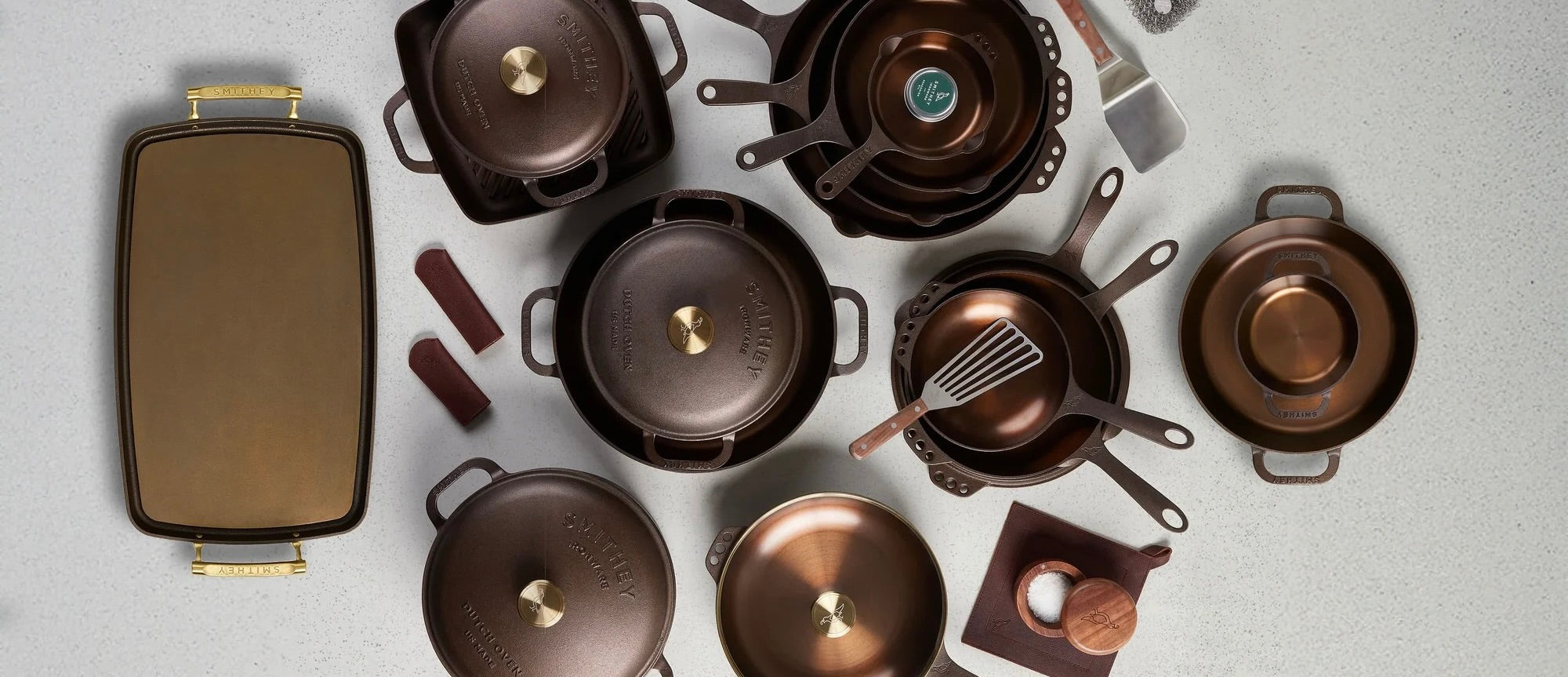
In the world of premium cookware, Smithey cast iron stands out as a top choice for home chefs seeking durable, versatile options that outperform everyday stainless steel pans. Handcrafted in Charleston, South Carolina, USA, Smithey Ironware Company produces heirloom-quality pieces designed to last generations. Unlike mass-produced alternatives, each skillet, Dutch oven, and griddle is meticulously cast, polished, and pre-seasoned for immediate use, delivering superior heat retention and even cooking—ideal for searing steaks, baking cornbread, or simmering stews.
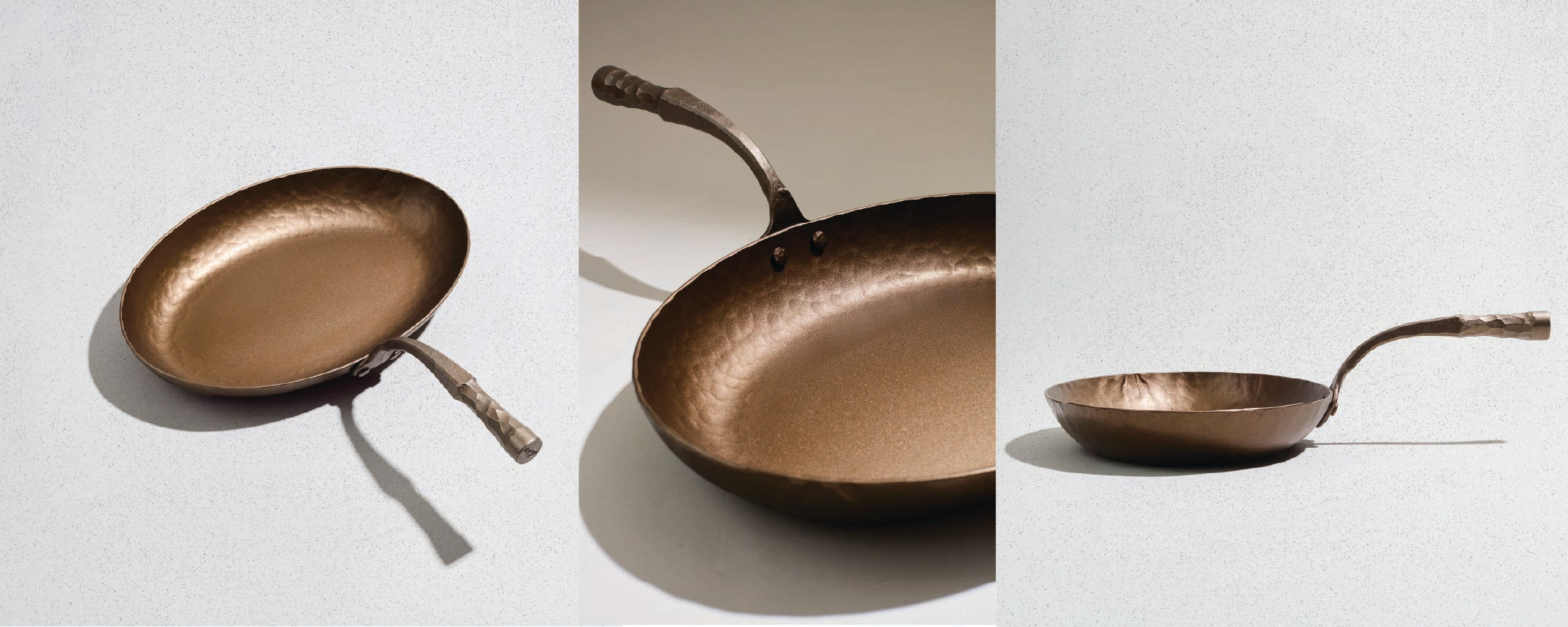
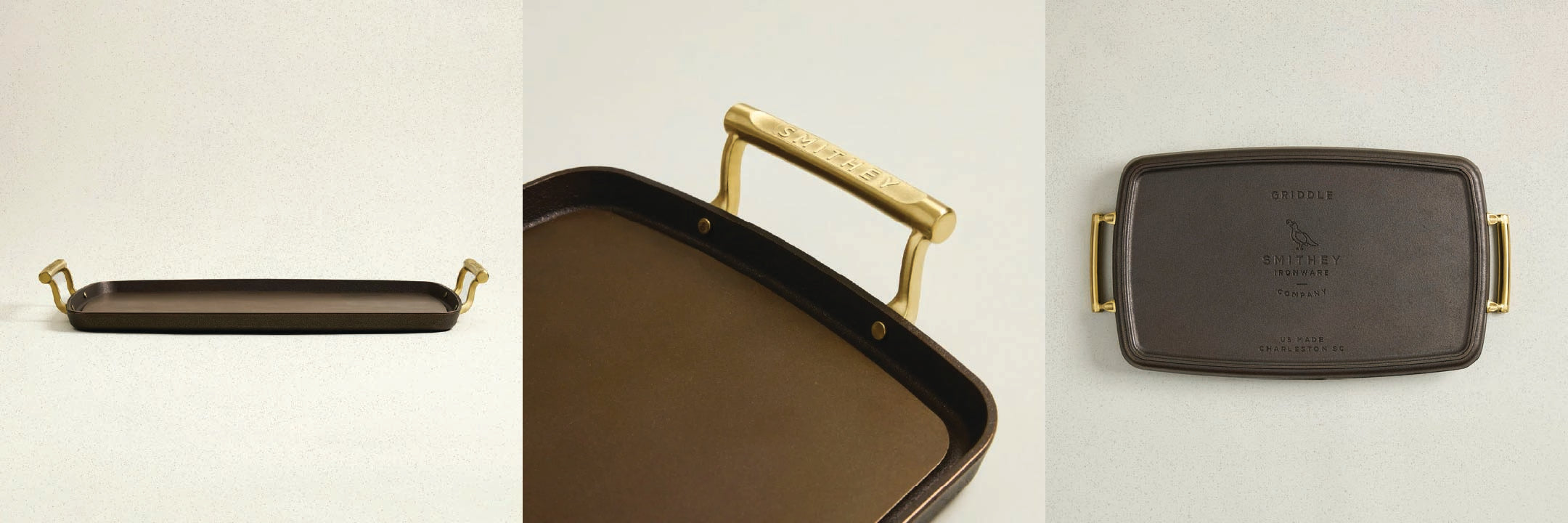
SIGNATURE COLLECTIONS
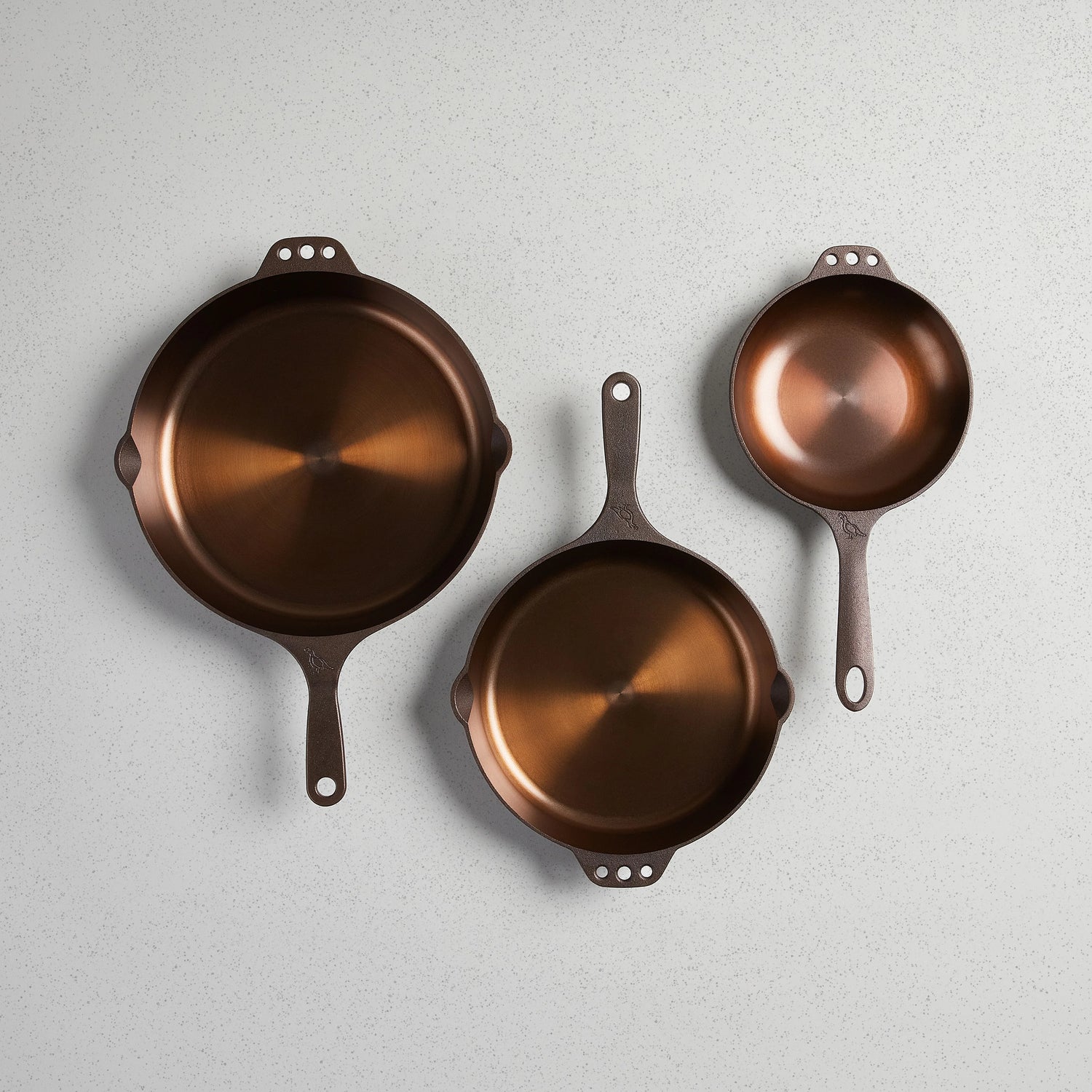
CAST IRON
- Hand-polished for a naturally non-stick surface.
- Retains heat beautifully for perfect sears.
- Designed to go from stovetop to oven to table.
- Built to last generations.
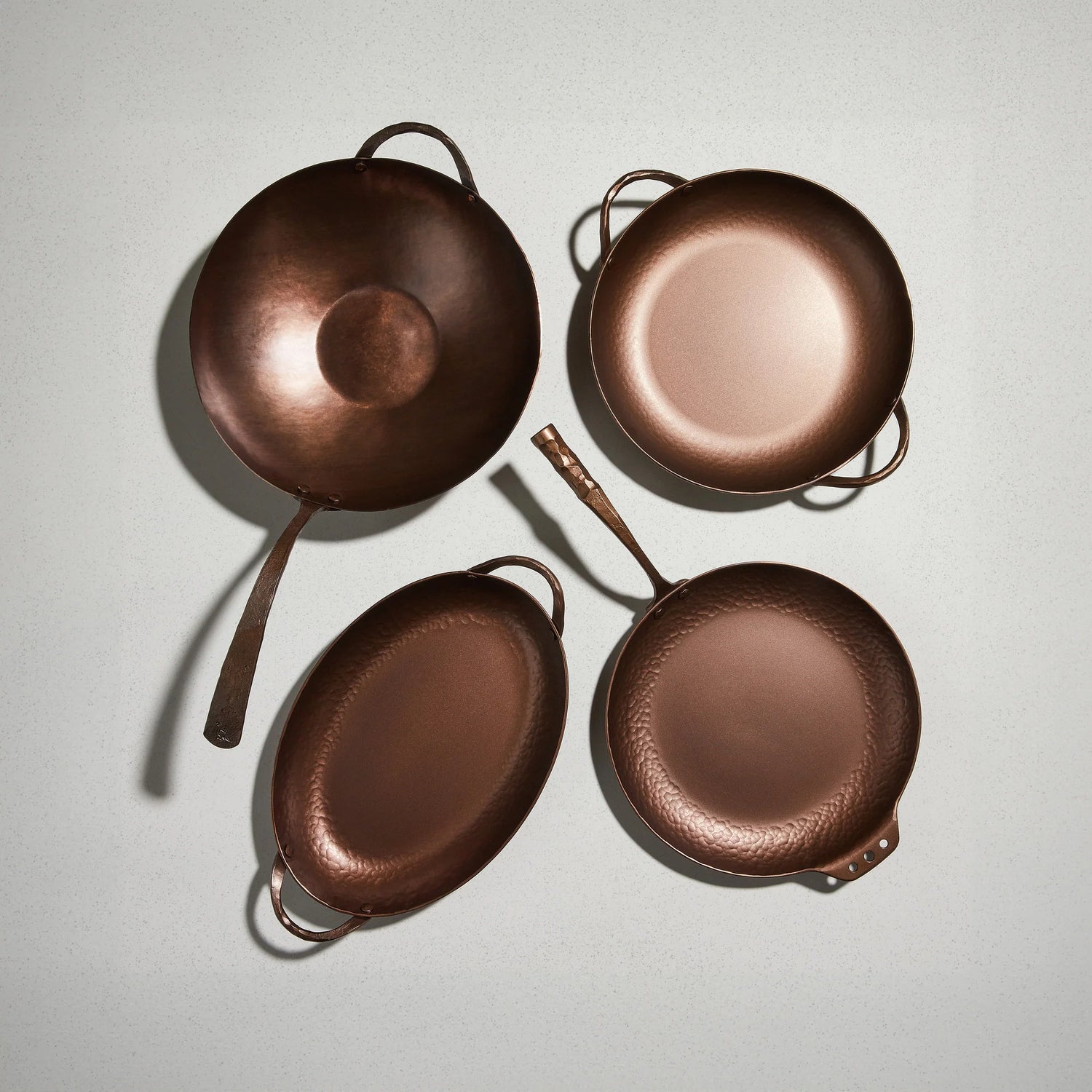
CARBON STEEL
- Lightweight yet durable — perfect for high-heat cooking.
- Responsive to temperature changes for precision cooking.
- Develops a seasoned surface with use, just like cast iron.
- Ideal for grilling, sautéing, and everyday stovetop cooking.
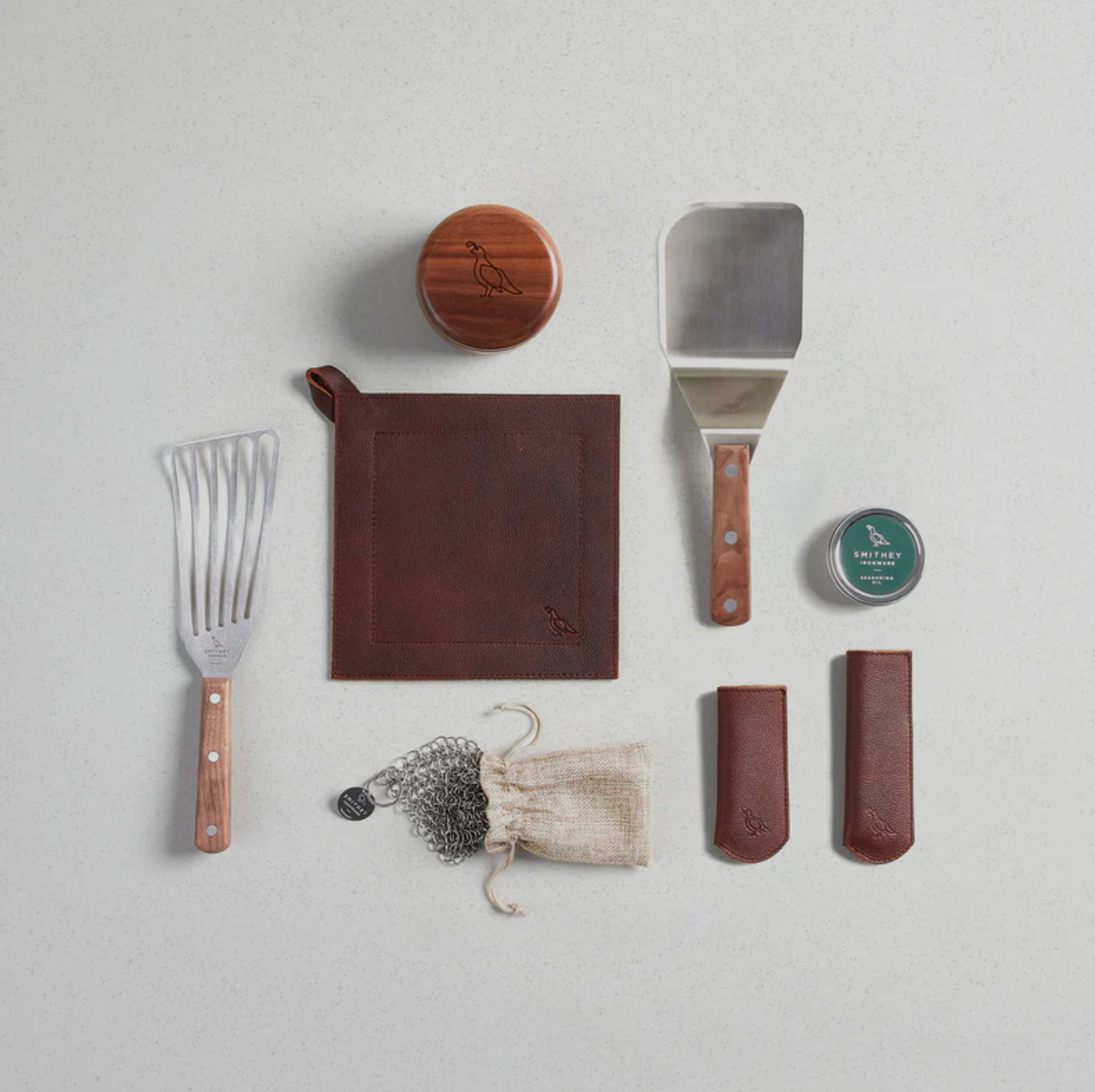
ACCESSORIES
Complete your Smithey collection with thoughtfully designed accessories that enhance both function and style in your kitchen. Discover fitted glass lids crafted to perfectly match your Smithey cast iron and carbon steel cookware. Pair your pans with handcrafted leather handle covers for a secure, and comfortable grip. Keep your cookware in pristine condition with specialized cleaning tools made specifically for cast iron and carbon steel, ensuring a lifetime of performance and beauty.

COOKWARE SETS
Smithey Cookware Sets combine timeless Southern craftsmanship with modern performance, offering the perfect balance of beauty and durability for your kitchen. Hand-forged and polished to perfection, each piece of Smithey cast iron and carbon steel cookware delivers exceptional heat retention, easy release, and heirloom quality that lasts for generations. Ideal for searing, baking, roasting, or everyday family meals, Smithey cookware is designed to elevate your cooking experience. Shop our exclusive cookware sets and pricing.
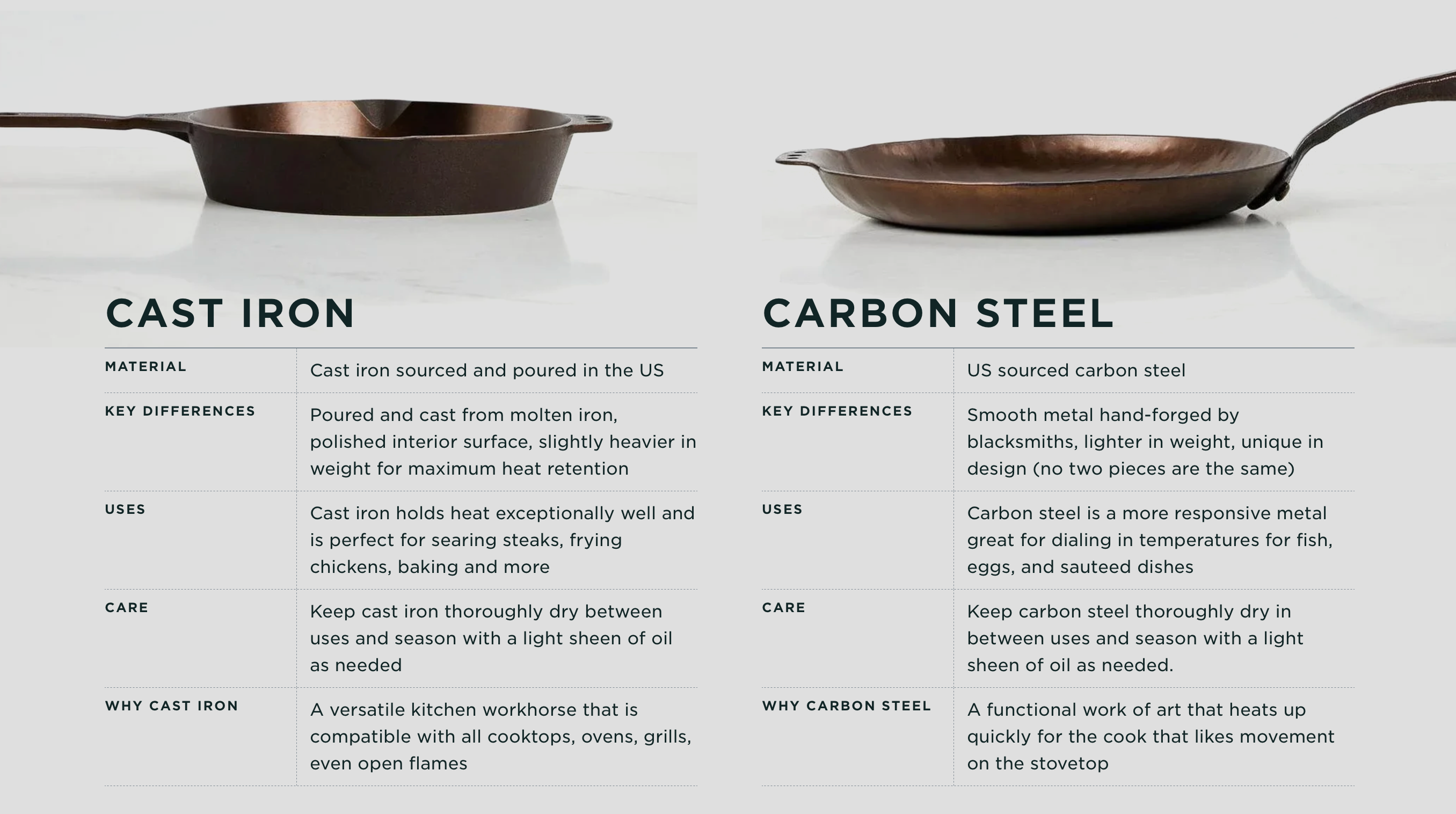
Why choose Smithey?
Craftsmanship: Each piece is finished by hand in Charleston, South Carolina.
Performance: Cookware designed to improve with every meal.
Sustainability: No throwaway pans — just timeless tools built to be restored and reused.
Heritage: Inspired by the past, crafted for the future.


DASH HOME + KITCHEN is a proud dealer of Smithey Ironware
228 UNION SQUARE NW #B HICKORY, NORTH CAROLINA
For those in North Carolina or beyond, DASH Home & Kitchen in Hickory, NC, is your go-to destination for Smithey cast iron. Our boutique store proudly sells and delivers a full range of Smithey products, including exclusive collaborations like the Smithey Slow-Cook Series. Whether you're upgrading from basic stainless steel to robust cast iron or expanding your cookware collection, DASH offers expert guidance, in-store browsing, and convenient shipping. Elevate your kitchen with Smithey—USA-made excellence, warranted for life, and available through DASH Home & Kitchen today.
Frequently Asked Questions
Can I bake in my Smithey?
Yes, cast iron is excellent for baking, and your Smithey is right at home in the oven. From golden cornbread to skillet cookies to rustic sourdough, cast iron offers incredible heat retention and even baking results that many traditional baking pans can’t match. Smithey skillets, Dutch ovens, and roasters are oven-safe and made for high heat, making them ideal for everything from crisping edges to baking bread with a beautiful crust. The heavy walls distribute heat evenly, which reduces the chances of burning or undercooking. A few tips for success:
- Always preheat the skillet or oven with the cast iron inside for even baking.
- For breads or baked goods, lightly oil or butter the surface - or use parchment paper for extra ease.
- Remember that cast iron stays hot well after it comes out of the oven, so let it cool before handling or slicing directly inside the pan.
Whether you are baking biscuits or roasting root vegetables, cast iron delivers excellent results with just a bit of prep - and it looks beautiful on the table, too.
Why is food sticking to my Smithey?
If your food is sticking to your skillet, especially when cooking lean proteins like eggs or fish, it likely means your skillet’s seasoning needs a little reinforcement. Think of seasoning like a savings account—each time you cook, you’re ideally making a deposit. But some dishes (especially acidic sauces or low-fat meals) can make a withdrawal instead. When more seasoning comes off than goes on, you may notice food clinging to the pan more than you’d like.The good news? Sticking is fixable and often short-lived. It’s just your skillet’s way of asking for a little TLC. Whether it’s a brand new Smithey or a well-loved one, a simple at-home refresh can restore performance and get things back on track. Regular care and a bit of patience are the keys to achieving that perfect non-stick patina. Here’s our recommended touch-up routine:
- Warm your skillet over medium heat for about 5 minutes.
- Add a small amount of high-smoke-point oil (grapeseed, flaxseed, or even beef tallow work well).
- Using a paper towel, rub the oil all over the skillet—inside, outside, and handle.
- Wipe away all excess oil—less is definitely more here.
- Let the skillet heat until it begins to smoke (this takes 1–2 minutes).
- Turn off the heat and allow it to cool naturally.
This process lays down a thin layer of polymerized oil that bonds to the iron surface—essentially adding a building block to your skillet’s seasoning. Over time, consistent use and care like this will result in a naturally non-stick finish. Until then, we recommend using a healthy amount of oil or fat when cooking and avoid scrubbing too harshly during cleanup.
How often should I season my skillet?
The short answer: not very often. If a Smithey is being used regularly, especially for cooking with oils or fats, it will naturally continue to season itself through use. There’s no need to re-season your skillet on a strict schedule—only when you start noticing performance issues.
A good rule of thumb is to re-season when food starts sticking more than usual, or if you see bare or silvery patches where the seasoning has worn away. These are signs that the seasoning layer is thinning or uneven, and a quick touch-up will help restore your skillet’s non-stick performance and protect the iron underneath.
If needed, re-seasoning is simple: clean and dry the pan, apply a very thin layer of high-smoke-point oil, and heat it until it smokes. Let it cool, and you’ve added a fresh layer of seasoning. Just make sure to wipe away any excess oil before heating to avoid a sticky finish.
Otherwise, keep cooking! With regular use and good care (drying thoroughly, storing properly, and avoiding overly acidic or low-fat cooking early on), your Smithey will maintain and improve its seasoning naturally over time.
Should I avoid using soap on my cast iron?
Nope, you don’t need to be afraid of a little soap. It’s one of the most persistent myths out there, but the truth is: a small amount of dish soap will not harm your cast iron seasoning when used properly.
Seasoning is a bond of polymerized oil—it’s a physical layer, not a loose grease coating—so it won’t simply wash away with suds.In fact, soap can be helpful after cooking particularly greasy or strongly flavored meals. A quick wash with mild dish soap and a soft sponge helps clean the surface without damaging your skillet or breaking down that hard-earned seasoning. What’s more important than avoiding soap is what you do after washing:
- Dry your skillet thoroughly (don’t air dry)
- Warm it briefly on the stovetop to evaporate any leftover moisture
- And wipe it with a thin coat of oil to protect against rust
Think of soap as a tool, not a threat. Heavy-duty scrubbing or soaking in water for hours? That’s a problem. But a little soap and a lot of care? Totally cast iron–approved.
